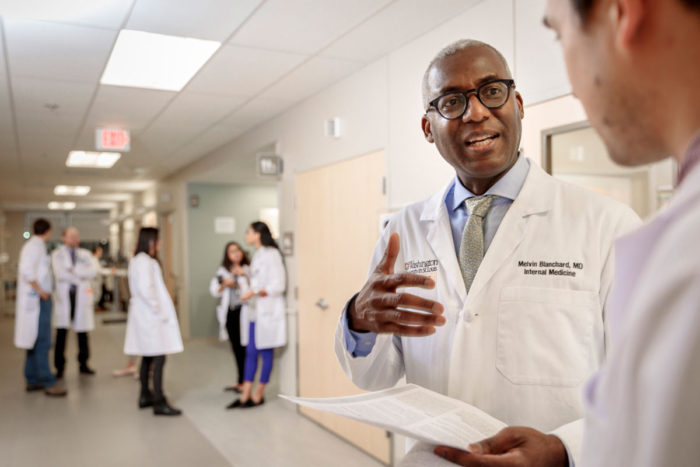Report addresses national shortage of physician-scientist trainees
Recommends standardized curriculum, tracking graduates
 Matt Miller
Matt MillerMelvin Blanchard, MD, talks with Andrew Young, MD, PhD, at the Center for Outpatient Health on the Washington University Medical Campus. Young, a recent graduate of the university’s Medical Scientist Training Program, recently started his residency training. Blanchard is the lead author on a study in which he advocates best practices for physician-scientist training programs.
Many lifesaving advances in human health can be traced to physician-scientists, the professionals who treat patients while also conducting biomedical research.
“They’re an essential national resource because of their collective impact on understanding diseases and helping to extend life spans,” said Melvin Blanchard, MD, director of the Division of Medical Education and of the Internal Medicine Residency Program at Washington University School of Medicine in St. Louis. “Additionally, physician-scientists have made the U.S. a world leader in biomedical research.”
However, projected demand for physician-scientists exceeds the expected supply, according to studies on the topic.
To help the physician-scientist deficit, Blanchard led a multi-institution project to develop recommendations to improve physician-scientist training programs in the U.S. The findings were published in May in The American Journal of Medicine of the Alliance for Academic Internal Medicine, which facilitated the project.
“A successful U.S. medical research enterprise is dependent on a well-trained physician-scientist workforce,” said Blanchard, the study’s first author. “Better training could improve the likelihood of success among physician-scientists. I surveyed the physician-scientist training directors in internal medicine and discovered that there was significant variability in educational approaches, and there was no national standard for tracking successes of program graduates. Our work helped to identify uniform best practices for training programs.”
Blanchard, who is also a professor of medicine, elaborated on the report:
Why are physician-scientists an essential national resource, as you call them?
The purpose of our nation’s biomedical research enterprise, which includes research in the laboratory and application of that research to patients with disease, is to improve the health and life spans of the U.S. population as well as people across the globe. We have been very successful in basic science and laboratory research, but have been less successful in applying that research to benefit patients. Physician-scientists serve as a bridge between the laboratory world and the real world of patients who present with symptoms to be diagnosed and treated. As such, physician-scientists are essential to improvements in human health. A healthy population ensures a large, steady and healthy workforce and, hence, a prosperous country. Therefore, physician-scientists are an essential national resource.
Why is the number of physician-scientists falling?
The decline is multifactorial. One reason for the drop-off is that fewer medical students are entering careers as physician-scientists. The training duration for physician-scientists is substantial: four years of undergraduate school, eight years of medical school and five to seven years of residency. Even more training is needed before one is ready for a major research grants from the National Institutes of Health (NIH). Forty-three is the average age when physician-scientists receive their first large grant from the NIH. Some students are not willing to commit to this training, particularly when there is no guarantee of success. Another reason is that for those on the path to becoming physician-scientists, an increasing number leave the field during training or during the early part of their faculty careers.
What are the strengths of Washington University’s physician-scientist training program?
Washington University is an excellent model for physician-scientist training. We have a process that facilitates the selection of trainees who are most likely to succeed, for example, those with strong research backgrounds and a balanced commitment to both science and medicine. Our training program is well-funded so there are adequate resources to support trainees and training infrastructure. The broader success of science at the university ensures an abundance of capable mentors and cross-departmental collaborations for trainees, essential ingredients for attracting the best students and for successful training. We also track our trainees and their post-training success carefully. This helps us to continuously improve recruitment and training.







